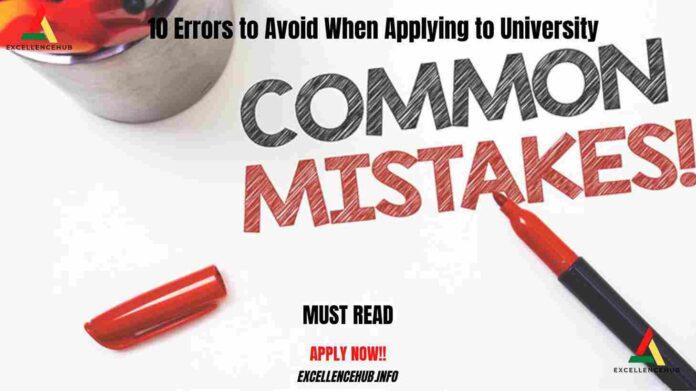There are a number of pitfalls that students who are thinking about pursuing an international degree should be aware of and avoid. Errors to Avoid When Applying to University.
Because studying abroad is typically a one-of-a-kind adventure, no one can truly foretell how things will proceed back at home. Our University Application Professionals were surveyed to determine the most common blunders ( errors to Avoid) that students make when contemplating an international education.
We’ve compiled a list of 10 common admissions essay blunders to help you avoid them.
Ten Common Admissions Application Blunders and How to Avoid Them
1.Submitting a Bachelor’s application without the right major
We all make it via our aspirations and hopes, and some of us arbitrarily choose to follow a different path. This is easier said than done, though. Applying for a Master’s degree in a field unrelated to one’s Bachelor’s degree is not possible. Or, even worse, they could submit an application but be rejected outright.
Let’s say you spent four years earning a Bachelor’s degree in psychology before deciding you’d rather go into engineering instead. If that’s the case, you can’t just submit an application for a Master of Constructions degree and cross your fingers. No! For your education to succeed, you must lay a solid groundwork. You can build this foundation; don’t panic; enroll in some online courses, explore the pre-Master’s programs your prospective institution may offer, and spend a semester or two in class. Just don’t dive headfirst into the deep end without first learning to swim!
2. Budgeting for your education based solely on tuition costs
While it may seem like a good idea to travel and hunt for the most cost-effective tuition charge while you’re trying to save money for your overseas trip, this isn’t always the case. Denmark, Finland, Sweden, Norway, and Iceland are examples of nations that may offer free tuition fees to EU students but also have some of the highest living costs in Europe.
The “ha-ha, I’m saving so much!” you’re feeling right now because of the tuition savings will quickly evaporate when you spend 10 EUR on a meal that could only be 2.5 EUR in Greece. It’s not only about food; you also need to think for lodging, transit, shopping, school supplies, clothing, and more. Errors to Avoid When Applying to University.
3. underestimating the cost of your chosen software
Put the “tuition fee” problem aside for the time being. Tuition rates are a topic worthy of study, and you should be aware of how they function. You may not qualify for the lowest degree prices that universities advertise.
Students from outside the European Union or the European Economic Area (EEA) studying in the EU will be charged more, as will students from states other than the one in which the university is physically located in the United States. Even in specific countries like the Netherlands and Finland, there are two distinct tuition structures depending on whether or not your undergraduate degree was earned at that institution or whether or not your tuition was covered by the government.
These are just a few instances, but the lesson still stands: investigate thoroughly the costs and justifications for any additional expenditures.
Apply also
Mastercard Foundation Scholarship at the University of Pretoria | Fully Funded
4. Overlooking the accessibility of scholarships
Please, take the time to read all the materials provided to you. Many different scholarship opportunities become available when you enroll in a study abroad program.
Many bright students avoid applying for scholarships because they assume they won’t be good enough to win one. Scholarship requirements can include essays on specific topics, as well as financial need and gender. A scholarship may be awarded to you if it is determined that doing so would be a wise investment in your future. This calls for extensive investigation.
5. ignoring your visa requirements
Do not assume a simple process. And we don’t mean to frighten you, but many prospective students view the visa as a formality and not a major concern. As soon as you receive your acceptance letter, you should begin the visa application process in earnest and maintain frequent communication with the Embassy of the nation to which you have applied.
While EU citizens are exempt from the need for a visa to travel between member states, students from other countries will need to apply for a visa to visit any country outside of the EU. Errors to Avoid When Applying to University.
Mistake #6: Submitting Incomplete or Incorrect Application Materials | Common Pitfalls
Some pupils, especially those dealing with it for the first time, may be confused by the subtleties involved.
Education systems are not universal because each country and government is unique. It’s not just a hassle to mail paperwork in response to requests from your prospective college or the visa office. You will be able to double-check everything; for example, have your documents been translated into English? Was it notarized by someone a potential college would recognize as trustworthy and legitimate? Did you successfully update the grades? There is a lot to consider, and if you have any queries, you should get in touch with the university’s international affairs office, as they will have the most helpful answers.
7. Failing to determine whether or not you will be able to work within the country while pursuing higher education
Let’s bring up the ‘work permit’ that so many students think about while we’re talking about paperwork and financial aid. You will require a work visa and will be limited to part-time employment if you wish to earn money while attending school. You should also learn that you can only work for the university during your time there, and that you need to apply for your post-study working papers while you are still in your home country; otherwise, you may not be able to work at all. Again, we’re not trying to put you off, but you should be aware of the potential risks and take precautions.
8. Believing you are the only one experiencing this | Common Mistakes
It’s understandable if the thought of taking stock of everything feels daunting, but try to remember that you have support at every turn.
I don’t know if you noticed, but we’ve already mentioned a plethora of resources to which you can turn for assistance: counsellors, embassies and consulates, international affairs offices, your future or current university, and so on.
Do not be reluctant to request assistance. It’s likely that the first overseas student had it the roughest, but after millions of students just like you, the path has been smoothed up and the obstacles removed.
9.Not being ready with a Plan B
Listen, we get that you have some plans for the future in mind, but just be aware that plans tend to change.
You should always have a safety net and be prepared for anything. Prepare for the worst by applying to various Master’s programs and researching potential careers and schools. Or maybe you’re wondering if you should take a niche year just in case your plans don’t go as… planned!
10. Leaving in the wake of a rejection | Common Mistakes
In terms of having a plan B at the ready… Stay determined. One of the most difficult things for a counsellor to witness is a student giving up.
No! We can’t allow that to happen. It’s something that everyone has to deal with at some point, and it’s not the end of the world if you do. Even if one college turns you down, you should keep trying. Perhaps you have set your sights too high in terms of what your money can buy. Don’t let that stop you from chasing your dreams, though; just apply for a scholarship or work for a few years to save up the cash you’ll need.
You can start your Master’s degree whenever you’re ready; it doesn’t expire. This is not necessarily the case after completing a Bachelor’s degree. To lose is to give up. Errors to Avoid When Applying to University.
Apply: The University of Oulu International Master’s Scholarships


